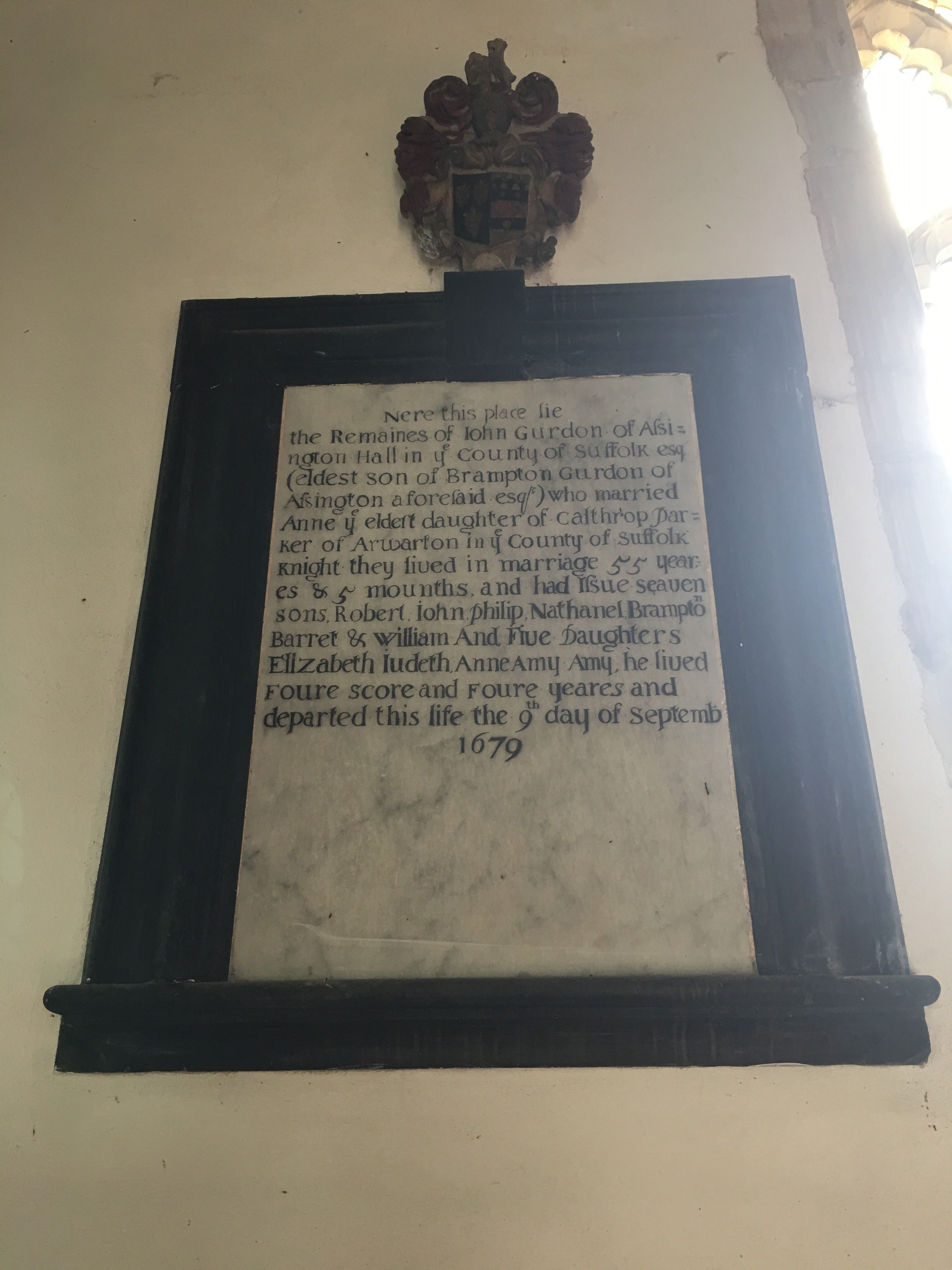John Gurdon (died 1679) on:
[Wikipedia]
[Google]
[Amazon]
John Gurdon (3 July 1595 – 9 September 1679) was an English politician who sat in the
/ref>

1595 births 1679 deaths English MPs 1640 (April) English MPs 1640–1648 English MPs 1648–1653 English MPs 1654–1655 English MPs 1660 Members of the Parliament of England (pre-1707) for Ipswich {{17thC-England-MP-stub
House of Commons
The House of Commons is the name for the elected lower house of the bicameral parliaments of the United Kingdom and Canada. In both of these countries, the Commons holds much more legislative power than the nominally upper house of parliament. T ...
variously between 1640 and 1660. He supported the parliamentary
A parliamentary system, or parliamentarian democracy, is a system of democratic governance of a state (or subordinate entity) where the executive derives its democratic legitimacy from its ability to command the support ("confidence") of the ...
cause in the English Civil War
The English Civil War (1642–1651) was a series of civil wars and political machinations between Parliamentarians (" Roundheads") and Royalists led by Charles I ("Cavaliers"), mainly over the manner of England's governance and issues of re ...
and was not returned to Parliament after the English Restoration
The Restoration of the Stuart monarchy in the kingdoms of England, Scotland and Ireland took place in 1660 when King Charles II returned from exile in continental Europe. The preceding period of the Protectorate and the civil wars came to ...
.History of Parliament Online - Gurdon, John/ref>
Political life
Gurdon was the son of a country gentleman, Brampton Gurdon, with estates at Letton,Norfolk
Norfolk () is a ceremonial and non-metropolitan county in East Anglia in England. It borders Lincolnshire to the north-west, Cambridgeshire to the west and south-west, and Suffolk to the south. Its northern and eastern boundaries are the No ...
, and Assington
Assington is a village in Suffolk, England, south-east of Sudbury. At the 2011 Census it had a population of 402, estimated at 445 in 2019. The parish includes the hamlets of Rose Green and Dorking Tye.
History
According to Eilert Ekwall, the ...
, Suffolk. He was elected to the Short Parliament and then the Long Parliament
The Long Parliament was an English Parliament which lasted from 1640 until 1660. It followed the fiasco of the Short Parliament, which had convened for only three weeks during the spring of 1640 after an 11-year parliamentary absence. In Septem ...
in 1640 for Ipswich
Ipswich () is a port town and borough in Suffolk, England, of which it is the county town. The town is located in East Anglia about away from the mouth of the River Orwell and the North Sea. Ipswich is both on the Great Eastern Main Line ...
.
During the Civil War, he supported the Parliamentarians. Later, when internal dissension broke out among them, he supported the Army party. He remained in the House of Commons after Pride's Purge
Pride's Purge is the name commonly given to an event that took place on 6 December 1648, when soldiers prevented members of Parliament considered hostile to the New Model Army from entering the House of Commons of England.
Despite defeat in the ...
, but when named one of the Commissioners for the trial of Charles I of England
Charles I (19 November 1600 – 30 January 1649) was King of England, Scotland, and Ireland from 27 March 1625 until his execution in 1649. He was born into the House of Stuart as the second son of King James VI of Scotland, but after hi ...
, he refused to attend. Even so, he was chosen as a member of the council of State
A Council of State is a governmental body in a country, or a subdivision of a country, with a function that varies by jurisdiction. It may be the formal name for the cabinet or it may refer to a non-executive advisory body associated with a head o ...
in 1650, 1651 and 1652.
After the expulsion of the Long Parliament, Gurdon sat for Suffolk in the First Protectorate Parliament
The First Protectorate Parliament was summoned by the Lord Protector Oliver Cromwell under the terms of the Instrument of Government. It sat for one term from 3 September 1654 until 22 January 1655 with William Lenthall as the Speaker of the Ho ...
(1654) and for Sudbury in the Convention Parliament of 1660. He was not re-elected after the Restoration.
Private life
Gurdon married Anne Parker, daughter of Sir Calthorpe Parker ofErwarton
Erwarton or Arwarton is a small village and civil parish in the Babergh district of Suffolk, England. The parish includes the hamlet of Shop Corner. Located on the Shotley peninsula around south of Ipswich, in 2005 it had a population of 11 ...
. His children included Philip Gurdon (c. 1630–1690), who was also an MP for Sudbury, and the Reverend Nathaniel Gurdon D. D. (died 1696), Rector of Chelmsford
Chelmsford () is a City status in the United Kingdom, city in the City of Chelmsford district in the county of Essex, England. It is the county town of Essex and one of three cities in the county, along with Southend-on-Sea and Colchester. It ...
, who survived his brother to inherit Assington on his death.
There is a memorial to John Gurdon in the parish church of Assington, St Edmund's.

References
*D. Brunton and D. H. Pennington, ''Members of the Long Parliament''. London: George Allen & Unwin, 1954 *''Burke's Landed Gentry'', 4th edition. London: Harrison, Pall Mall, 1862–1863 * *''Cobbett's Parliamentary history of England, from the Norman Conquest in 1066 to the year 1803''. London: Thomas Hansard, 1801595 births 1679 deaths English MPs 1640 (April) English MPs 1640–1648 English MPs 1648–1653 English MPs 1654–1655 English MPs 1660 Members of the Parliament of England (pre-1707) for Ipswich {{17thC-England-MP-stub